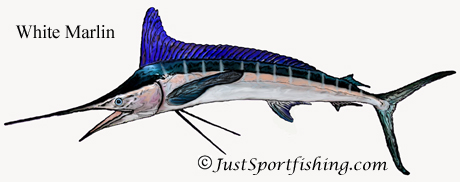|
Home Game Fish Fishing Knots Tackle Tips Videos Pictures Tips Rods & Reels Boats Cook your Catch Articles About Contact |
|
Donate to JustSportfishing.com and help to build the largest fishing information site on the web. Even a dollar or two will keep us building this free site. |
White
Marlin World
Record
~ 181 Lbs 14 oz. Caught at Vitoria, Brazil Dec. 8, 1979 Evandro Luiz
Coser Scientific
name
~ Tetrapturus Albidus Other
names
~ White Marlin, Atlantic White Marlin, Spikefish Identification
~ The body of the White Marlin is dark blue along the back and silvery
white below, with brown spots on the sides of the white portion.
Occasionally some White Marlin may have many rows of light blue or
lavender bars that run the length of the body. The first dorsal fin is
dark blue with many black spots, although these may fade towards the
back of the fin. The second dorsal and pelvic fins are dark blue The
pectoral fins and tail fin are blackish brown. The pectoral fins may be
tipped in white. The White Marlin has a long, compressed, moderately
fusiform body. The upper jaw forms a bill, which is round in cross
section, and long and slender in comparison to many other billfishes.
Two dorsal fins and two anal fins are present. The first dorsal runs
most the length of the body. Pectoral fins are long and broad and the
pectoral and dorsal fins are rounded not pointed. Size
~ White Marlin can reach a length of over 8 feet and a weight of up to
180 pounds. Most angler caught White Marlin measure from 50 inches to 83
inches and fall between 40 and 70 pounds. Habitat
~ The White Marlin generally swims above the thermocline, in water of
surface temperatures above 71°F., it is a pelagic and oceanic fish that
can be found in water over 325 feet deep but can also be found close to
shore in as little as 50 feet of water or at the surface displaying a
technique known as "tailing," in which only the dorsal lobe of
the tail fin is visible above the surface of the water. They are often
associated with upwellings and weed lines, and frequent regions where
the bottom has drop-offs, canyons, and shoals. White marlins do not tend
to travel in schools, but are usually observed swimming alone or in
pairs. The White Marlin has a distribution from approximately 45°N to
45°S in the western Atlantic Ocean and 35°S in the eastern Atlantic
Ocean. Feeding
Habits
~ White marlin are sight-oriented daytime feeders. White Marlin often
gather near fronts, the edges between water bodies of differing
temperatures, currents, or salinities. The meeting points of these areas
produce nutrient-rich waters that rise from the depths and mix, drawing
baitfish, and thus are successful feeding areas for the White Marlin.
White Marlin prey on squid, dolphins, blue runner, mackerels, flying
fish, and bonito are commonly eaten. Round herring, which are abundant
along the central Atlantic coast, are commonly consumed in that region.
|


